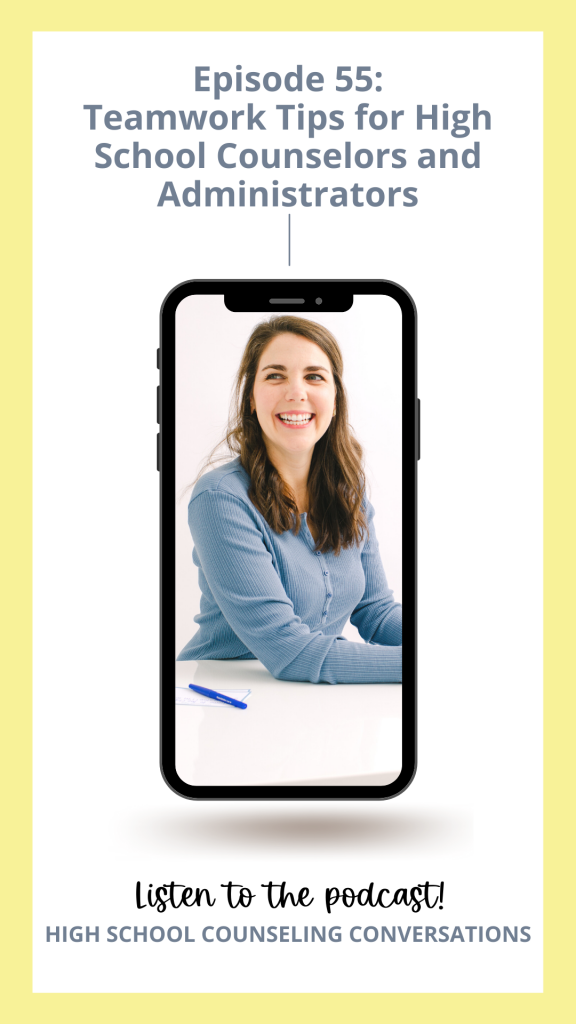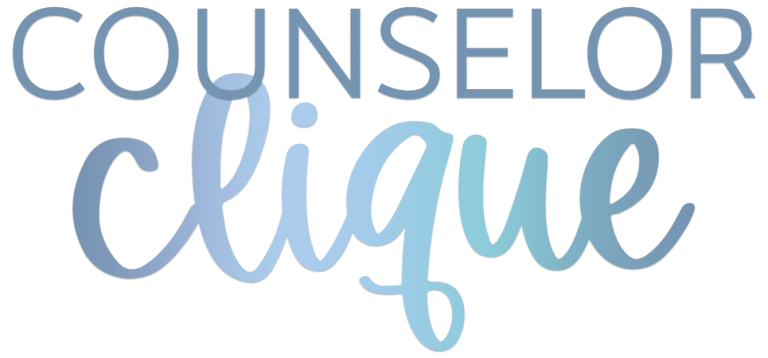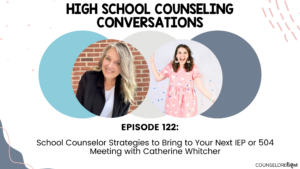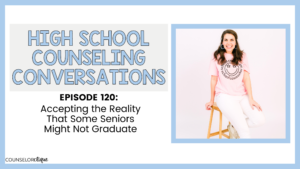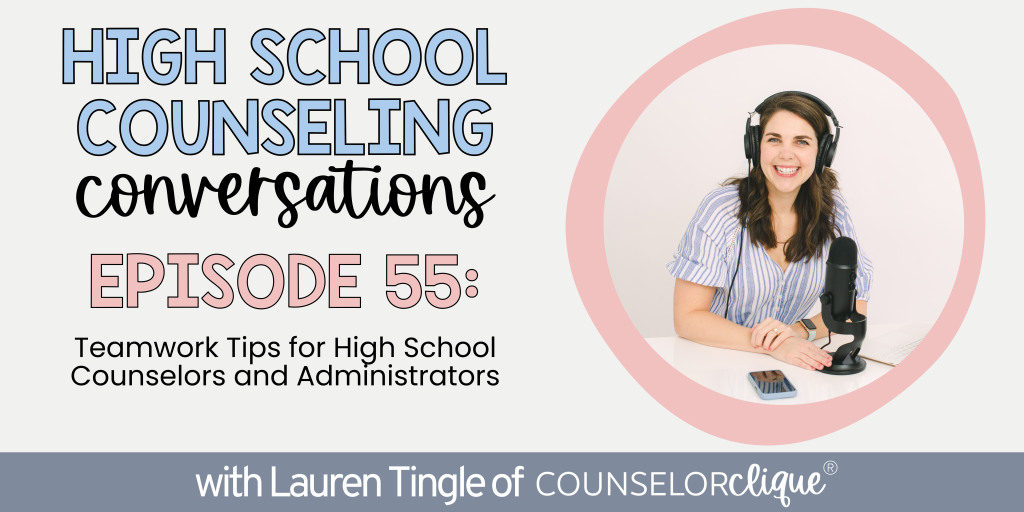
Here's What to Expect In This Episode:
The relationship between high school counselors and administrators is an important one. You often work closely together supporting students and their families. However, both of you juggle very busy schedules, so how do you stay on the same page in terms of communication and collaboration? It’s a delicate dance, but it is possible!
Hopefully you’ve had positive relationships with your administrators, but it’s likely that you’ve also come across some challenges. Maybe you have trouble getting one on one time with them, or they’ve pushed some boundaries, or you don’t agree with something they’ve said to a parent in a meeting.
Ultimately, we all have different communication styles and ways that we approach certain situations. This doesn’t mean that we can’t have great relationships between counselors and administrators. We just need to know how to develop and build these relationships with care.
Today I’m giving you some personal examples of three admin relationships that I’ve had. I’ll tell you all about what went well in these partnerships, and what didn’t go so well.
Best of all, I’ll share my best tips for working as a team so that you can strengthen your counselor-administrator relationships. Taking the time to do this will not only take your school counseling services to the next level, but it will also better serve your students.
Don’t forget to sign up for the Reset for Success Challenge! You can grab your game board here. Be sure to hang on to it while you’re listening to this episode, episode 56, and episode 57. You could be the winner of a Counselor Clique tumbler, $50 TPT gift card, and custom sticker pack!
Topics Covered in This Episode:
- Some of the things that school counselors and administrators have in common
- What I’ve learned from my personal counselor-administrator relationships
- Advice for having the scary and uncomfortable conversations with your administrators
- The importance of understanding the communication styles and perspectives of your colleagues
- Establishing a clear system for how you and your principal will see each other
- The many benefits of opening lines of communication with your admin
Resources Mentioned in This Episode:
- Download your game board here!
- Sign up for my free, live workshop: Three Practical Ways to Bring your High School Counseling Program Back to Life in the New Year
- Resource: Clifton Strengths Finder
- Podcast: Episode #51, How Your Skills & Strengths as a School Counselor Can be Used in a Private Practice with Lorraine Holeman
- Leave your review for High School Counseling Conversations on Apple Podcasts
Other Blog Posts You Might Like:
Read the transcript for this episode:
Hi, my friends, you’re listening to Episode 55 of High School Counseling Conversations. If you’re listening to this the week it comes out, let me be one of the first to usher you into 2023. Let’s get after it.
I know you’re in the right place to listen to this podcast because that means you’re ready, willing and able to dive into some positive changes in your high school counseling program. I am pumped about that. And I cannot wait to walk alongside you in that.
I wanted to first give a quick shout out to podcast listener and Clique Collaborative member Rebecca, Rebecca sent me a quick DM on Instagram recently that made my day.
She said, we are now listening to your podcast and we discuss some of the main points like as in her whole department sits down, they listen. And then they use that as their PD. Her department is using high school counseling conversations as many PD opportunities to brainstorm for their program.
She went on to tell me some of the new programs that they’re doing and how they bring life to what they were already doing. And then Rebecca said, our counselor who’s been here for nine years was on the verge of burnout. This is helping her so much.
I never in my wildest dreams ever thought that I would have a podcast that could rejuvenate a department like this, this exchange absolutely filled me up. Because this podcast is meeting a need that I always set out to meet as Counselor Clique.
I want to re energize your school counseling program and remind you of how much you love your job. So thanks for sharing that encouragement with me, Rebecca. And I hope that this is encouraging to the rest of you that maybe you would use this podcast as the mini PD in your department.
High School Counseling conversations has officially turned one year old. This is wild right? Let’s celebrate for the month of January with a big giveaway and a live event. This month, you can expect regular weekly podcast episodes delivered to your podcast player wherever you already like to listen.
I want to give you a preview of what’s coming up though here, we’ve got this episode talking about administrator relationships. Next week, I have Alana from cutting edge school counseling, talking about productivity and habits.
And then we’re talking about parent relationships, team dynamics and setting boundaries for yourself. All sorts of goodness to reset your 2023 and take off on the right foot. So stay tuned for those.
Soak in each of those episodes when they come out. Now, here’s where I challenge you with something practical and perhaps outside of your comfort zone. It’s how you’re going to find success by resetting yourself for the second semester.
It’s going to require you to take some action steps but that’s how we get better and grow. Right. I want to invite you into the reset for success challenge going on this month. You’ll download your game board by going to counselorclique.com/reset.
I’ll link it in the show notes and I’ll post on Instagram but I’ll explain to you here how your game board works. As you listened to this episode and the next two, you’ll hear a code word somewhere that episode, I’ll make sure that you hear it.
You write your code word down on the game board and you fill in your action step for the episode. You’ll also see a sign up link for one of my free live workshops coming up this month. Once your game board is filled out, you’ve got your entry ticket for the giveaway.
And here’s what I’m thinking. You’re listening to the podcast episode anyway. So you might as well enter the giveaway right? Here’s what you win – an Arctic tumbler mug that says Counselor Clique on it, a $50 TPT gift card and a sticker pack of exclusive stickers that I made for members in the clique collaborative.
Okay, you heard me mention the free live workshop that I’m putting on this month. It’s called three practical ways to bring your high school counseling program back to life in the new year. I did it last year it was a hit. People enjoyed it.
And so we’re doing it again. I’m hosting it live and virtually three times this month. Once we kick those off will open doors to the clique collaborative High School Counseling membership.
Cliffnotes here’s a quick summary. Get your game board at counselorclique.com/reset and hang on to it while you’re listening to this episode and the next two. It has everything you need on it to enter the giveaway.
I can’t wait to see who wins the reset for success challenge! Let’s dive into why you showed up here in the first place to hear about teamwork tips between high school counselors and high school administrators.
High School Counseling conversations is a podcast where we talk about exactly that.
A casual potpourri of school counseling topics intended to grow us as school counselors but also give us space to enjoy each other’s company.
I’m Lauren from counselor clique and I’m sharing my experiences and perspectives as a high school counselor. No topic is off limits and I’m certain we’ll cover it all.
I’m your high school counseling hype girl here to help you energize your school counseling program and remind you of how much you love your job.
Whether you’re just getting your feet wet as an intern or you’re nearing retirement, you’ll feel like you’re just popping in to catch up with your school counseling bestie let’s go
I don’t know if this is everyone’s belief, but I know everyone listening to this podcast will at least agree with me. High school counselors are like the nucleus of their schools. You You are the center point of your school.
Yes, the school revolves around your students, but you are a hub of information and you’re a connection point for so many people in that building, even if not all the people are in your building, like you are a connection point for people outside of your school walls.
High school counselors work daily with students, teachers, school nurses, front office staff, parents who have meetings, parents who drop in, and administrators. We’re juggling all sorts of relationships at all times. I guess we’re the relationship experts in our building.
The only other person I think, who comes close to that level of relationships is administrators. So I think we have more in common with them than we initially think right off the bat. We both juggle all of those relationships with busy schedules and lots of meetings.
We both have never ending to do lists and tasks that never seem to get done. We both deal with really happy people and really angry people. We do a little bit different of jobs, though, after the relationship kind of part of it, which is a good thing. A school needs both of us to function.
So how do we high school counselors and administrators best work together? Instead of butting heads getting frustrated or feeling dismissed by each other? Let’s talk about it. First, how do you prefer to communicate and how does your administrator prefer to communicate? I made a funny reel about this like a year ago or something and many of y’all related to it.
Sometimes it can feel like administrators are straight up avoiding you with how hard they are to track down in your school building. Okay, I know that’s most likely not the case, they’re probably not trying to avoid you. But they are always on the move and hard to track down. And I guess that’s why so many of them have walkie talkies.
Listen, I don’t need a walkie talkie, I don’t need to be found all the time, I don’t have time to listen to the chatter back and forth on one, feel free to convince me otherwise, because I will just go ahead and hunt down my admin in other ways before I ask for a walkie talkie.
I know it feels like something we’d all just assume may happen naturally. But we have to talk about how we would like to talk to each other. This can be a casual quick conversation with the one administrator you’re tasked to be on a team with or it could be a more formal meeting at the beginning of the year with the entire counseling team and the entire administrative team.
This may take some work from both parties to understand each other, even down to the differences and personalities of the people on both of these teams. There’s nothing that says all counselors love and have to communicate by email and also nothing that says all administrators are just a phone call away and ready to hear from you.
I have had both good conversations and hard conversations with administrators that pushed us to be better teammates. So let me tell you about three different administrator relationships that I’ve had and what went well with them. And then what was hard about them.
Of course, I’ve worked with more than three administrators. But I’m just going to use these three as different examples and tell you what I have learned from them. I’ve worked with all different caseload models over the year. So I’ve had a few different opportunities to work one on one with a tight knit teammate.
But then also, I’ve done models where all the counselors worked with all the administrators. Here’s the first administrators situation that I’m going to lay out there. You’ve heard me talk about this administrator before because she was my favorite one to work with. If any of my past administrators are listening, sorry, I’m ranking them.
She was my favorite. She was my favorite for a few reasons. She had a lot of experience. And I always felt like I was learning from her. With that experience also came a directness and a boldness that really just came with her territory as an administrator and as someone with a lot of experience, and I would say this really showed itself around parents and students.
She would say things in meetings, that would make me squirm, because I would have never said that, for whatever reason. She had been doing this for a long time, she had the credibility, and she had the boldness that I did not feel like I had.
I felt like this helped us become a good team. Because yes, sometimes that truth needed to be delivered to someone. But I remember having a side conversation after a meeting one time giving her some more details about the student and the parent situation where she could have delivered something in a more gentle manner, had she known a bit more about the situation.
And like she was not supposed to know about that situation. Do you know what I mean? Like she did not know about that without me telling her. So that’s like where we had to work together as a team. And listen, I also know that these one on one conversations with someone might seem scary. Like when I had to follow up with her after that meeting. It was a little daunting.
But those confrontations are necessary. So that resentment or annoyance, doesn’t build up like inside of me. To start a conversation like that. I’d try and say it as soon as I felt like I should not sleep on it for a week and let it build. Because then she would have forgotten about it by a week later.
Like if it happened, then I need to address it fairly quickly. So here’s what I did. Here’s an example like a sample script of the conversation that I had with her so that we could still continue to be good teammates.
So this conversation for example, I said something like “Hey, you know when you said XYZ in that meeting? You might not have noticed this because you didn’t know this piece of the puzzle, but I saw the mom get a little uncomfortable because of her background and situation, I think we just need to be careful next time we go into a meeting with them about the assumptions that we make.
And this is not your fault. Like you didn’t know this, and I can definitely fill you in on more. I honestly didn’t think that that would play into our group conversation today. But here we are.”
So I finished this conversation between me and my administrator was something that went well about the meeting, and then how we’ve continued to help the parent and the student. I knew that if I didn’t say something early on, it could happen again. And then the relationship with that parent might be hurt.
I was really nervous how she would respond that administrator, but she handled it with such grace, like she was like, Oh, you’re right. I didn’t know about that. And I should not assume something about the situation.
I’ll share one more situation that was a little more personal with this administrator about how we had to work through some more communication issues. When I came back to work after having my first daughter, I had to close the door, lock my door to, ahem, pump, part of the duties that come with going back to work as a new moms providing sustenance for your child, but having to take time during the workday to do that.
And as a new mom transitioning back into the workplace, I was already feeling all the feels, I was torn, because I wasn’t with my baby. I felt guilty for using work time to pump. But I also knew that this is legal, and I should not feel guilty. And then I was stressed because I was losing work time to do this. All the things that come with being a new mom, right?
And listen, I was probably hormonal too, and not always a happy person to be around. So every three hours, I’d shut and lock my door to my office, draw the blinds and I pump. And I learned early on, I wasn’t going to answer my phone during this time. It wasn’t going to take long in the scheme of things. And it was worth it for me not to be stressed and not to have the noisy thing in the background.
Now here’s where it gets interesting. My administrator, this one who I love so much. She knew this is what I was doing. But one day she was knocking on my door and then going back to her office and calling me and doing all the things to get my attention. I’m like, is there an emergency going on, like what is going on.
But then I lost it when she slipped a note under the door telling me she was waiting in the conference room with a parent until I was done. And like I said, Maybe I overreacted because I was being hormonal. But I didn’t feel like this was appropriate to have everybody just like sitting there waiting on me.
And it had been a long time since she had been in the situation like this. Like she had kids when she was younger. They’re all grown up. She just hadn’t been in this situation in a long time. And I know that she wanted to respond with empathy. But I had to come to her and say, Hey, this is pushing some boundaries. I know you don’t even realize it because this is not a situation you’ve been in recently.
But we talked about it afterwards. And then we talked about how awkward and how pressured it made me feel. And it didn’t happen again. It was not her intention to make me feel that way. For me it was more like the family that was sitting there waiting on me, I felt so stressed because of that. And I brought it up, we talked about it. And we moved on.
This administrator and I had a really good open door. Well, except for when I was pumping, communication style that I loved. We both benefited from it. And really our students benefited from it. We work together with seniors that year that she and I worked together. And I was so thankful to feel like I had a real teammate during that super stressful year for me.
Strong communication really ease the burden, I didn’t take the burden completely away. It was still the most stressed I ever was as a counselor, but the strong communication really helped it. I knew that someone was in it with me and I knew that I could count on her to get things done.
Next up is administrator scenario number two, I worked with this administrator the year I had one particular grade level. And then I also worked with him when we shifted to alphabet. So obviously everyone worked with everyone then. And we butted heads sometimes not in a personal way, but just in a communication way.
It was really hard for me to figure out what worked best between us. I really spent a lot of time trying to figure it out. In a personal sense. He was the kindest human he is he was, you know, when we work together and he still is.
He always remembered my anniversary. And remember details about my daughter, this meant so much to me. I actually was amazed at how he did this because this feels like a rare trait in anyone. I definitely don’t have the brain capacity to do this for that many of even my closest friends and family. So I’m setting the scene I’m telling you he is as kind as kind come.
We were both always on the go people remember, I don’t have a walkie talkie, so I really struggled to touch base with him on a consistent basis. I also learned pretty quickly that email was not the way I was gonna get him. Sometimes he’d respond. Sometimes he wouldn’t, which I’ll admit was hard because sometimes you need things in writing.
You know what I mean? We never settled on some hard and fast communication rules, but I sensed a shift in our working relationship when our two departments admin and counselors really sought out some solutions for better understanding each other.
This can be a great solution if you feel like it would be awkward to go toe to toe with someone about their communication style or their style of leadership or work or whatever.
We did the StrengthsFinder assessment everyone in both of our departments, administrators and count counselors, then we use a big chart that comes with a book and we blew it up to poster size.
We all put our names on it and rated our strengths next to the chart not rated filled in our strengths on the chart, you’ll know what I mean, when you do the assessment. I remember him coming up to me afterwards saying something like, now we know why it was so hard sometimes or something like that.
And honestly, it caught me off guard, I got a little self conscious like, wait was I the difficult one to work with? And then I thought, listen, we are both two different people with different strengths.
When I saw that up on the poster, it rocked my world, I noticed that we see the world through different lenses, we solve problems differently, we communicate differently.
Noticing that was really helpful for me, because I realized I didn’t need everyone to do the same things as me. I didn’t need someone to problem solve and communicate the exact same way I did, or even the way I wanted them to. They all have their own unique strengths and gifts that can fill gaps that I don’t have, and I will never have.
He and I were very different when you laid out our strengths on the chart. And we would have never had that conversation on our own. And we would have never carved out time to troubleshoot that. Without that assessment and big team meeting, we probably would have kept moving forward like in parallel lines.
Like we want to move forward for our students. And we want our students to move in the right direction. But we have different ways of getting there. And understanding each other helped us get more on the same page was all of itself right then and there?
No, of course not. But I was a more forgiving and gracefield coworker because I knew I could approach situations with a little more humility than I had in the past.
I want to let you know about something special coming up! Doors to the Clique Collaboartive, my high school counseling membership are opening on January 18. But not before we do some free live workshops.
Head over to counselorcliquek.com/workshop to sign up for a live professional development opportunity and some time to connect with other high school counselors in a virtual setting. I’ll be teaching on three practical ways to bring your high school counseling program back to life in the new year. And I want you there with us.
Once you sign up, you’ll get a link and some reminder emails to join us live for the time slot that you choose. Save your seat now by heading to counselorclique.com/workshop. I’ll see you there. Now back to the show.
The last administrator I’ll reference was actually a principal I worked with, I’ve worked with three different principals who all lead with very different styles. I learned a lot about leadership from all three of them. Some things I’ll take with me and use and some things I’ll take with me and not use.
This one principle. But I’ll take some things from let’s talk about him. I know principle isn’t necessarily a peer, they’re a boss to you. But we’re still a team. He needs me to do things that help and benefit the school. And I need him to support me so that I can achieve those things. So we are a team.
Maybe students don’t realize how much work we do together as a team. But it makes a world of a difference to have an administrator who is for you and on your team. This may be a personal issue I have but when I respect a leader, they asked me to jump and I say how high?
I’ll work my tail off for someone I respect who values my work. And maybe we all feel that way I would venture to say we probably do.
It may be worth it to do that values inventory that my guest Lorraine talked about a few episodes ago in Episode 51, to see what you really value in a workplace or a boss or leadership. This would be a great place to start the conversation.
I’m not entirely sure how to completely change a leader to get them to be all the things that you need and get them to act the way that you need on your team, especially if it’s a personality issue that you get stuck with. But if it’s a school issue, I have some ideas
With your principal, establish a clear system for how you’ll see each other you’ll feel heard and valued if your leader is taking the time to hear and value you. Yes, I know, duh. But let’s figure out do you book appointments on the calendar? Is that how you find them and talk to them?
Do you know you can always catch them at the front door in the mornings. And so that’s where you’re gonna go find them to talk to them. I think the more face to face time you have with that person, the more credibility you develop, especially if you’re new to working with each other.
Does the administrator need to pop into your department meetings once a month to check in? Do you need to give them an update on your goals just to show them the direction that things are headed with what you’re working on and where you’re moving?
Think of every way possible to establish a communication system and then follow up with it. You will most likely have to lead in this charge though. We all have 100 things on our plates. But this is important to you. And it’s more likely more important to you than it is to them if we’re being honest.
Why should opening these lines of communication be important? Well, so much can come out of this. Here’s a few – a more well respected program because the principal sings your praises around the school and the district. More student centered work meaning less test coordination on your part less bus duty or cafeteria duty.
More opportunities for outside support, like time off to travel to your state conference or financial support to join the Clique Collaborative for relevant professional development. The list goes on and on.
An administrator who knows and loves what you do is one who supports you, and that’s the one who you want to work for, right? It’s a delicate dance from both sides, but it is possible.
Whether you have yet to nail down those specific communication tools that you need to get the job done with your administrator like leaving a voicemail writing an email scribbling a note sending a carrier pigeon.
Taking the time to examine your admin relationships will strengthen your school counseling services, your students will be better served because they have two people at least on their team.
If it takes putting a meeting on the calendar or going through an annual agreement explaining your role or advocating for direct services, do it, it will be worth it for them to understand what you do and what you need from them so that you can best do that.
From there, decide how you’re going to keep up those admin relationships. It’s time to develop a relationship with your administrator and set a game plan. It’s important. You’ll be missing a key player in the development of your program if you’re not cashing in on this relationship in your school.
I hope you grab some takeaways from three different administrators I’ve worked with and what I learned from those experiences. I know you can reflect on your own good and bad experiences and pull from them. And I challenge you to do that.
And then speaking of challenge, this week’s code word is superstar. If you’re wanting to jump into 2023 and see some professional growth, I’d encourage you to download the reset for success challenge gameboard at counselorclique.com/reset
You’ll fill in the first code word as superstar. Stay tuned for the next two weeks to fill in your challenge board with your next two code words and hopefully you’ll be the winner of the Counselor Clique Tumblr, $50 TPT gift card, and custom sticker pack.
Remember to register for the free live workshops happening in two weeks counselor clique.com/workshop I cannot wait for you to save your seat. I’ll see you next week when I get to welcome Alena on the show as a guest to talk about productivity and habits.
Thanks for listening to today’s episode of high school counseling conversations. All of the links I talked about today can be found in the show notes and also at counselorclique.com/podcast.
Be sure to hit follow or subscribe wherever you listen to your podcast so that you never miss a new episode. Connect with me over on Instagram, send me a DM @counselorclique. That’s C-L-I-Q-U-E.
Thanks so much for hanging out with me. I’ll see you next time.
Connect with Lauren:
Cheers + Happy Listening!
Like what you’re hearing? Follow and leave a review on Apple Podcasts. It helps other high school counseling friends find it!
Can’t contain your excitement? Share the pod! Tell a friend! Your word-of-mouth referrals mean the world to me!
